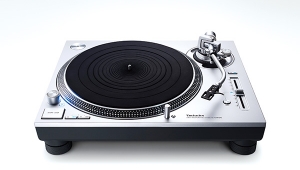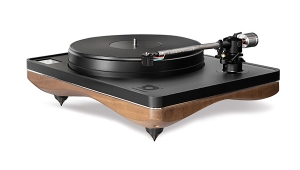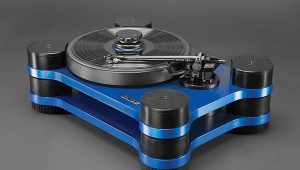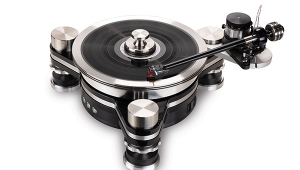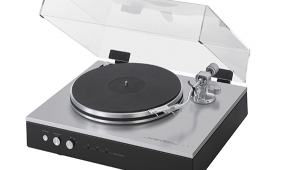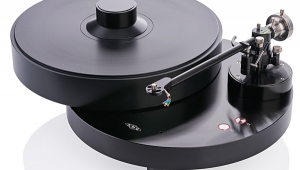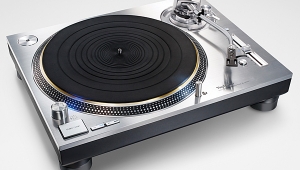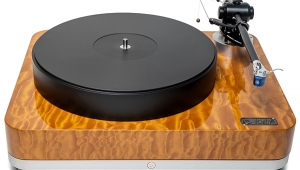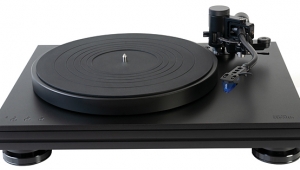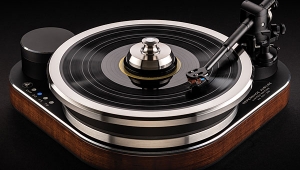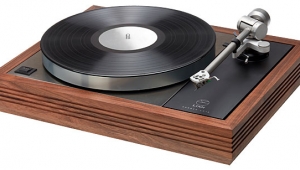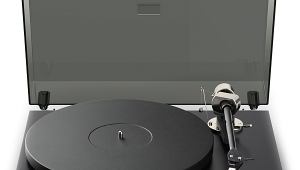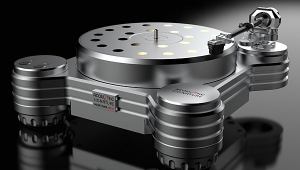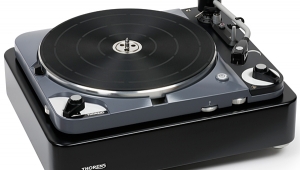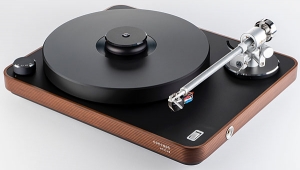| Columns Retired Columns & Blogs |
VPI HW-19 turntable Audiophile Systems Comment
Audiophile Systems Responds
Editor: We find it interesting that Tony Cordesman deems it desirable to open his review of the Improved SOTA Star Sapphire, VPI HW-19, and Oracle Delphi Mark II turntables with a shot at Linn Products, particularly given his subsequent dismissal of the Linn Sondek as a second-rate turntable. Mr. Cordesman states, "The fact that Linn Sondek's advertising has made a British cult out of buying a comparatively high-priced Linn turntable—even for comparatively low grade components—has no justification other than profits for Linn." We are certain that Mr. Cordesman is sincere in this opinion, and probably did not intend this statement as a cheap shot. Nevertheless, it is sadly misinformed, and deserves correction.
First, the company is Linn Products, not Linn Sondek. They are best known for their turntable, the Linn Sondek LP12, but they manufacture a range of products: five cartridges, three tonearms, a preamp, a power amp, five models of loudspeakers, and soon an electronic crossover and a new turntable (the Linn Axis). Given this broad product range, Linn's investment has been to try to see to it that customers actually get systems that make sense, not necessarily that they buy a turntable. This has been largely accomplished not by advertising, but by Linn dealer's proving the point to their customers with demonstrations and comparisons.
We here at Audiophile Systems do not feel we are in a position to analyze the idiosyncrasies of the British hi-fi market. (We wonder that Mr. Cordesman, who is certainly less connected to it than we, feels that he is.) In the US, as most readers of this letter will already know, we've done very little advertising, and the great majority of what we have done has been devoted to our speakers, amplifiers, and tonearms. On the other hand, most US Linn dealers will be happy to demonstrate the difference that turntables make in any system, or do an analog/CD comparison.
As far as we are concerned—and we have made this point again and again over the years—the only thing that ultimately matters is that the customer hear the difference for himself, and make his own decisions. We certainly cannot be counted on to give an unbiased opinion. As to reviewers, we doubt that there are very many of them who are free of preconceptions about the gear they review; we have encountered more than one over the years with a personal axe to grind. That is why we long ago quit reprinting and distributing favorable reviews of our products. It all seemed rather arbitrary to us, and in any event, it isn't the reviewer who has to live with, or pay for, the product the customer buys. Since the customer does, it's very important that he listen to the equipment in a properly set-up system, and make his own judgments about its merits.
Certainly, Linn maintains that turntables make an important difference in the performance of a system. Indeed, Mr. Cordesman's review would be pointless if this were not the case. When Linn began forcefully promoting this point to a skeptical industry over a decade ago, it was widely assumed that turntables with like measurements would sound largely the same, and contribute very little to the character of the system. In those days, the semi-annual Linn turntable A-Bs at the Consumer Electronics Shows were quite an event, and opened a lot of eyes and ears. They proved that a good turntable will yield benefits that can be heard in almost any system.
Whether this is always enough of an improvement to justify the cost of the turntable, or the most cost-effective way to improve a particular system, is a totally different question. Certainly, any top-notch system requires an impeccable source if it is to perform to its potential. In many mid-level systems, improving the turntable is often the most effective way to gain an overall improvement, depending on how good the rest of the system really is. In cheaper systems, the justification for owning an excellent turntable is that it will certainly result in some improvement in performance. It also provides a solid foundation, which will not need to be changed, upon which to subsequently improve the rest of the system.
We agree with Mr. Cordesman that "no one need sneer at cheap analog record players." There are many legitimate analog turntables that can be employed optimally in a range of systems. On the other hand, using a cheap record player as the source for an uncompromising amplifier and speakers will only result in a sound that is disappointing, no fun, and worth sneering at. For years now, we have been trying to educate consumers who have been advised by prominent reviewers to put "50% of their budget in the loudspeakers" to avoid this pitfall. We sell loudspeakers, but we want to sell them in systems that sound good.
We understandably do not like to be portrayed as con artists, which is the inescapable implication of Mr. Cordesman's statement. We have worked too long and hard trying to deliver something of legitimate value to the consumer, both in terms of a product and a service, to overlook this sort of comment. Indeed, it seems unlikely that the Linn Sondek turntable could have been in continuous production for 15 years—and we just had our record month (April 1986) for both overall sales and unit sales of turntables—without having offered something of legitimate value, and without our being able to prove it. We've seen a lot of people get conned. We've stayed around, and grown stronger, by putting our money where our mouth is. We've taken the time to demonstrate the differences we claim, to the satisfaction of the customers who have to live with the product.
As to Mr. Cordesman's perfunctory assessment of the Linn as not belonging in the same category as the decks he is reviewing, we can only say that we disagree (no surprise, eh?). We have done comparisons of the Linn with all of the turntables he reviewed, and found the Linn significantly more enjoyable to listen to than any of them. Perhaps we are prejudiced. Perhaps Mr. Cordesman is. Perhaps we just listen differently. On this score, we note that Mr. Cordesman observes, with respect to pitch accuracy, that "Fortunately, most people recognize (this) by lack of long-term listening fatigue." While we agree entirely with this point—indeed, long-term listening fatigue is the way people find out about most faults in their hi-fi—we find this most unfortunate. It results in a lot of serious music lovers repeatedly shelling out a great deal of money for hi-fi systems that they really don't listen to after about three weeks. This makes for a lot of repeat business for dealers, and a large market for review magazines, but it's awfully hard on the customer. In the end, we think it isn't very good for the industry.
Accordingly, we've spent the last few years trying to promote a system of evaluating hi-fi equipment that's intended to let people know quickly how well they'll live with the system over a long period. This has become popularly known as "singing along with the tune," and, while it has nothing to do with perfect pitch, it does rely on attending to both the pitch and the rhythmic relationships in music. Most people can do this, and it goes a long way toward telling whether a system is acceptable or not to them. It also has the effect of demystifying hi-fi, and eliminating most of the obscure jargon of the cult. This has not endeared us either to reviewers or other manufacturers, who largely depend on this mystique and its impenetrable jargon to support their expertise. In other words, we're not the only ones with an investment here.
Readers may wonder that Mr. Cordesman's short references to Linn Products should provoke such a lengthy and strongly-stated reply. However, Mr. Cordesman's casual assertion that we are simply profiteering in promoting what we think to be a sensible approach to building a hi-fi is certainly a serious charge. We sincerely have no idea of his motives, but we find it irritating that Mr. Cordesman, who seems to understand very little about what we are doing, should so glibly state this position. We full well intend to make a profit, but we've tried to do it by offering a legitimate product, a legitimate service, and talking a lot less nonsense than usually goes around in this industry. It is quite one thing if Mr. Cordesman disagrees with our approach, or simply doesn't think we know what we are doing. That's his right—the feeling is obviously mutual. It's quite another for him to question our ethics, or dismiss the legitimacy of our enterprise.—Anthony M. Gregory, General Manager, Indianapolis, IN
That's what we like, spirited replies. A copy of Audiophile Systems' comment has been forwarded to AHC, but not in time for a reply to appear here. Knowing AHC, I doubt that he'll feel compelled, but I may be surprised.—Larry Archibald
- Log in or register to post comments
